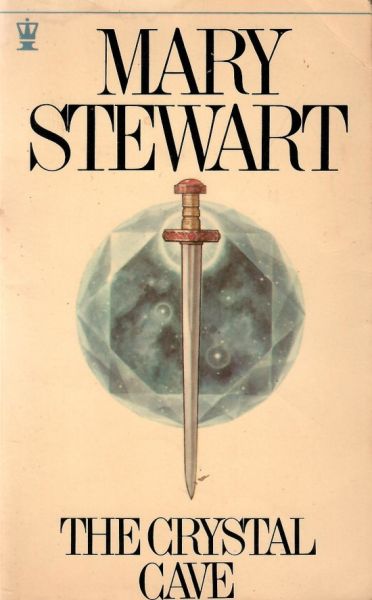Where Fancy is Free
The Crystal Cave (Merlin Trilogy, volume 1 The Arthurian Saga, book 1)
By Mary Stewart

19 Feb, 2023
The Crystal Cave is Book One of Mary Stewart’s Arthurian saga, which comprises five books: the Merlin trilogy (The Crystal Cave (1970), The Hollow Hills (1973), The Last Enchantment (1979)), The Wicked Day (1983), and The Prince and the Pilgrim (1995).
The Roman Empire having withdrawn in 410 AD, post-Roman Britain enjoys a golden age of instability, violence, and invasion. Myrddin Emrys, the bastard son of Welsh Princess Niniane, will be known by many names, of which the most familiar to modern readers is Merlin.
A bastard is beneath notice and this particular undersized bastard is not interested in the usual boyish activities. He isn’t a stalwart warrior. Fortunate for Merlin, as he might otherwise not have survived his youth. His ambitious uncle Camlach is perfectly willing to clarify dynastic succession by pruning the family tree but for the moment, Merlin isn’t an obvious threat.
Merlin has prophetic visions. Unfortunately, he can neither control when he has them or whose future he sees. Schooled by hermit mage Galapas, Merlin gains some knowledge of magic, as well as other matters useful to the boy. This is fortuitous because Camlach will soon realize Merlin is a potential impediment and needs to be removed.
Merlin’s royal grandfather (never named, as far as I can tell) slips and dies in a fall. Camlach is content to allow Niniane to enter a convent. Merlin requires a more permanent solution. Preferring not to be murdered, Merlin flees.
Eventually finding his way to what is now known as Brittany, Merlin joins (with some difficulty) the court of Ambrosius Aurelianus. Ambrosius has ambitions to invade Britain and unify it under himself as High King. Ambrosius is not the only man determined to be High King. He may be the only one with a magician on his side.
Returning to Britain, Merlin is captured by Ambrosius’ principle rival Vortigern. Vortigern has a use for Merlin: rumored to be the son of a demon, Merlin would make an ideal sacrifice to stabilize the foundations of a fortification Vortigern is building. Merlin’s magic cannot save him. But Merlin does not need magic; he can outthink his superstitious captors.
Ambrosius sweeps aside Vortigern but his rule is short. He is succeeded by his brother Uther, a man whose passions overrule his reason. Britain’s immediate future will be very exciting, particularly for a mage drawn into Uther’s hairbrained scheme to woo Lady Ygraine.
If Britain is destined to enjoy peace and unity, such an outcome looks unlikely to arrive soon.
~oOo~
This book is very nearly historical fiction1. Merlin can sometimes see the future and he can light fires. Otherwise, this is a low magic setting, perhaps because mages like Galapas have a habit of being killed by brigands before they can pass on all that they know. Said brigands also burn libraries, seeing no value in them.
Just as magic decays, so does infrastructure. The various peoples of Britain are happy to occupy Roman facilities but they lack the ability or perhaps the inclination to maintain them. Thus, although the novel is set in the 5th century, soon after Rome’s exit, Roman buildings are quickly falling into ruin.
The Crystal Cave, along with Rosemary Sutcliff’s The Lantern Bearers, formed my view of what Arthurian fiction should look like: unambiguously post-Roman. Contending warlords are battling for rule without any regard for preserving knowledge or government functioning. They are losing sight of the big picture (a settled, prosperous society) and chasing immediate goals.
Stewart seems to be reacting to earlier versions of the Arthurian legends. This might have influenced her choice of viewpoint character; Merlin, who is a supporting character2 in many tales, gives us a look at events from another perspective.
Stewart’s version of Arthurian fiction is nicely written and quite engrossing3. I could almost regret not being able to read her Arthurian novels for the first time, were it not that I had only read the Merlin trilogy. I had no idea that The Wicked Day (1983) and The Prince and the Pilgrim (1995) existed. More first-time reading for me!
The Crystal Cave is available here (Amazon US), here (Amazon Canada), here (Amazon UK), here (Barnes & Noble), and here (Book Depository). Chapters-Indigo is still down due to a malware attack.
1: Leaving aside the question of whether Arthur and company were any more historical than Atlantis.
As far as I can tell, there is no connection between the Stewart books and the dreadful 2008 – 2012 Merlin TV series.
2: I do recall reading a story in which Merlin has to solve a murder, which he does using the mystical art of closely observing details like shoe stitching patterns.
3: I particularly enjoyed Stewart’s afterword comments on how she addressed various issues with the source material to produce something modern readers would enjoy.
